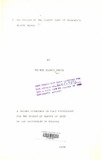| dc.description.abstract | This thesis examines the vision of the tragic heroic self in Soyinka's tragic drama. Soyinka's presentation of the vision of the tragic heroic self in A Dance of the Forests,The Strong Breed, The Road and Death and the king's Horseman, is his unique way of ordering experience ,and
bringing about change in society. The significance attached to the exploits of the heroic characters,
Demoke, Eman, Professor, Elesin and Olunde is comprehensible within the mythic framework invoked
by the playwright in the four plays. Its foundations lie in the Yoruba conception of tragedy and
overall apprehension of destiny.
In Chapter One, we look into Soyink's life background and artistic vision with a view to understanding and appreciating the strength and uniqueness f his vision in the light of the many arguments over the kind of vision African writers should project. Chapter two explores what constitutes tragic experience in Soyinka's drama. We not only show the relationship between Soyjnka's tragic drama and the Yoruba conception of tragedy, but also examine his tragedy in relation to the evolution of
this theory. We see how the vision of the tragic heroic self fulfils the potentiality for tragic
action in the yoruba sense of the term. We also see how Soyinka invokes Yoruba traditional mythology to present his vision.
Chapter Three focuses on the nature of the heroic characters in their determinant worldview. It is vital to show this relationship since the worldview determines -every-move a character-makes.
Lastly, we attempt a deeper analysis of the forms of the vision of the tragic heroic self as brought out by the tragic heroic characters whenever they act out roles commensurate with their apprehension of destiny within the cosmos. Apparent from all this, is the fact that Soyinka approaches the social historical phenomena he deals with in the tragic plays with the mythical rather than the materialist sensibility. His presentation of the vision of the tragic heroic self is an obvious result of his mytho-religious creative sensibility.
We note that the contents of the tragic plays are both concrete and symbolic. They are concrete because they relate historical experiences and symbolic because to understand their import, we first have to unraveL the mythic framework within which they are ordered and presented. For example, the
events of A Dance of the Forests relate to Nigeria's independence celebrations and yet this relationship is not a direct one. We only arrive at the conclusion of the Half-Child being representative of the young nation through an act of interpretation. Demokers choice of returning the Half-Child to theDead Mother can therefore be seen as Soyinka1s subtle presentation of what he regards as awaiting the young nation.
It is in invoking such a mythic framework that Soyinka is able to advance a vision whereby change and renewal in society is tied up to the fate of the heroic characters. We note that the qualities that go L the shaping of the heroic into characters derive from Ogun, a Yoruba deity known for having
taken the prodigious risk of attempting to unite the human world with the spiritual. These characters similaly exhibit extreme courage in their roles I to bring change in the human condition. intended
Change is not brought about by the concerted effort of the collective members of a society, but by the
heroic characters who through courage and dedication undergo experiences whose implications incorporate the society as a whole.
Significantly, we demonstrate the effectiveness arid optimism inherent in the vision of the tragic
heroic self. T-t-has-been-the fee 1ing of most critics that in presenting this vision, Soyinka demonstrates a static mind that refuses to heed to Africa's socia-historical imperatives. In this thesis we
demonstrate how workable and dynamic this vision is. | en |

